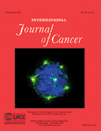Selective Chk1 inhibitors differentially sensitize p53-deficient cancer cells to cancer therapeutics
Abstract
The majority of cancer therapeutics induces DNA damage to kill cells. Normal proliferating cells undergo cell cycle arrest in response to DNA damage, thus allowing DNA repair to protect the genome. DNA damage induced cell cycle arrest depends on an evolutionarily conserved signal transduction network in which the Chk1 kinase plays a critical role. In mammalian cells, the p53 and RB pathways further augment the cell cycle arrest response to prevent catastrophic cell death. Given the fact that most tumor cells suffer defects in the p53 and RB pathways, it is likely that tumor cells would depend more on the Chk1 kinase to maintain cell cycle arrest than would normal cells. Therefore Chk1 inhibition could be used to specifically sensitize tumor cells to DNA-damaging agents. We have previously shown that siRNA-mediated Chk1 knockdown abrogates DNA damage-induced checkpoints and potentiates the cytotoxicity of several DNA-damaging agents in p53-deficient cell lines. In this study, we have developed 2 potent and selective Chk1 inhibitors, A-690002 and A-641397, and shown that these compounds abrogate cell cycle checkpoints and potentiate the cytotoxicity of topoisomerase inhibitors and γ-radiation in p53-deficient but not in p53-proficient cells of different tissue origins. These results indicate that it is feasible to achieve a therapeutic window with 1 or more Chk1 inhibitors in potentiation of cancer therapy based on the status of the p53 pathway in a wide spectrum of tumor types. © 2006 Wiley-Liss, Inc.




